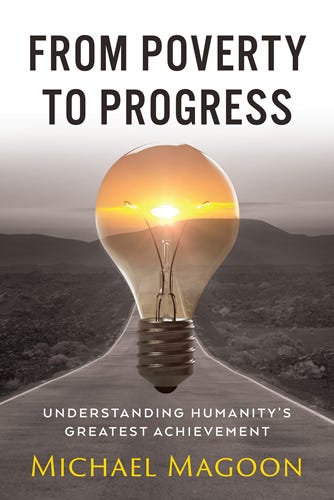Virtually all useful energy comes from the sun
So let's appreciate it
Recently I have been posting many articles on society types, energy, and the impact of geography on human history. I have spent so much time writing about these topics because I think that it is impossible to understand the origins of human material progress and its causes without these critical concepts.
I wanted to write an article that emphasizes an important fact that is often neglected. Human history is about how we have learned to combine energy and other raw materials to create technologies that enable us to transform the natural environment to make our lives better. This transformation is impossible without energy, and virtually all useful energy comes directly or indirectly from the sun.
One can view human history as a gradual evolution of more complex types of societies that result from the innovation of specific technologies that enable people in a specific natural environment to use energy from the sun to create energy-dense foods. This quest has a huge number of unanticipated side-effects that result in human material progress.
The following is an excerpt from my book From Poverty to Progress: Understanding Humanity’s Greatest Achievement. You can purchase discounted copies of my book at my website, or pay full prize at Amazon.
You might also be interested in reading my “From Poverty to Progress” book series:
See also my other articles on Society Types and related topics:
Why are there such huge variations in income across the globe?
Commercial societies (which invented modern progress)
Solar energy directly creates solar power and photosynthesis for plants. Herbivores then consume those plants, and carnivores consume those herbivores. Humans then take a very small subset of plants and herbivores for use in food production. We also use wood as a combustion source of energy in the form of heat. And trees need the sun to grow.
Just as important is stored solar energy in the form of fossil fuels. We do not often view fossil fuels in this way, but that is essentially what it is. Wind is another energy source that derives from different levels of solar energy on different parts of the planet. The air molecules then redistribute themselves in the form of wind. Water power also indirectly comes from the water cycle that starts with evaporation due to heat from the sun.
In fact, the only major energy source that does not derive directly or indirectly from the sun is nuclear fission. Even nuclear fusion is capturing the power of the sun on Earth.
Transforming Energy into Complex Societies
So let’s see how humanity has learned to transform energy. At a very high level, the process through which humans transform energy into complex societies is the following:
The Sun creates solar energy by fusing hydrogen into helium. Sunlight injects a portion of that energy onto planet Earth.
Plants gather that solar energy and transform it into sugar (via photosynthesis).
Herbivores eat plants and transform that sugar into energy to power their bodies (via metabolism).
(In Hunter-Gatherer and Fishing Societies) Humans innovate technologies, skills, and organizations that enable them to acquire food from their local environment by:
Hunting wild animals
Gathering wild plants
Fishing
(In Horticultural and Agrarian societies) Humans innovate technologies, skills, and organizations that enable them to acquire far greater amounts of food from their local environment by:
Farming domesticated plants, particularly grains.
Herding domesticated herbivores.
Increased food production means that a typical farming family can generate more food than they need to survive and reproduce.
This increased food surplus is channeled into:
Having more babies, which increases the population. This trend increases the rate of innovation.
Establishing centralized institutions that extract the food surplus from farmers and give it to political, economic, and religious elites. This trend decreases the rate of innovation.
But this is still not progress
I have made the statement many times before, but I want to be clear. The process above did not create human material progress! This process created change without any increased standard of living for the masses. But almost all of these changes were necessary for progress to occur at a later date. Or to put it more accurately, Agrarian societies were only able to create one (productive agriculture) of the Five Keys to Progress.
It would take thousands of years for the other four Keys to evolve and for the resulting progress to emerge.
The above is an excerpt from my book From Poverty to Progress: Understanding Humanity’s Greatest Achievement. You can purchase discounted copies of my book at my website, or pay full prize at Amazon.
See also my other articles on Society Types and related topics:
Why are there such huge variations in income across the globe?
Commercial societies (which invented modern progress)









The Sun is also a low density energy source. Curiously the fusion energy density in the sun's interior is similar to an animal metabolism.
I like the energy density of uranium & thorium 2M x that of fossil fuels which are already highly concentrated solar energy. That wonderful incredibly dense energy source, far, far exceeds all the fossil energy on the Earth. A gift from Mother Nature, forged in the incredibly violent collisions of neutron stars that release more energy in a fraction of a second than the Sun does in its entire lifetime. One of these Kilonovae can create a planet Earth mass of gold, similarly for other heavy elements.
[Continuing here after checking your link to Intro to 5 Keys of Progress]
Your 5 factors required for Progress:
1) A highly efficient food production and distribution system.
2) Trade-based cities packed with a large number of free citizens possessing a wide variety of skills.
3) Decentralized political, economic, religious and ideological power. It is of particular importance that elites are forced into transparent, non-violent competition that undermines their ability to forcibly extract wealth from the masses. This also allows citizens to freely choose among institutions based upon how much they have to offer to each individual and society in general.
4) At least one high-value-added industry that exports to the rest of the world.
5) Widespread use of fossil fuels.
If I understand your 7a or 7b situation correctly, then factor 1 applies to both; while factors 2 and 3 apply to 7b but maybe not 7a?
And factors 4 and 5 may not yet apply. On factor 3 on centralized power, I suppose it falls into a level of degree or an "it depends" situation? Innovation is a necessary but not quite sufficient condition for your view on Human Progress? Sometimes we forget to include institutional innovations in the category of innovation, since we tend to focus more on technological advances than changes in human nature. Glad you include that aspect.
On factor 5, I believe Michael Shellenberger has a slide showing a "progression" from increasing material intensity to increasing energy density as contributing to the betterment of mankind. I gather that means primitive wood, bone, stone tools to more complex artifacts like reed baskets, bows/arrows, early ceramics, sun dried or fired bricks, etc. But all obtained with limited energy sources up to wood.
Then he shows the progression of energy density (maybe as solar, wind, dung, wood, coal, oil, gas, nuclear?).